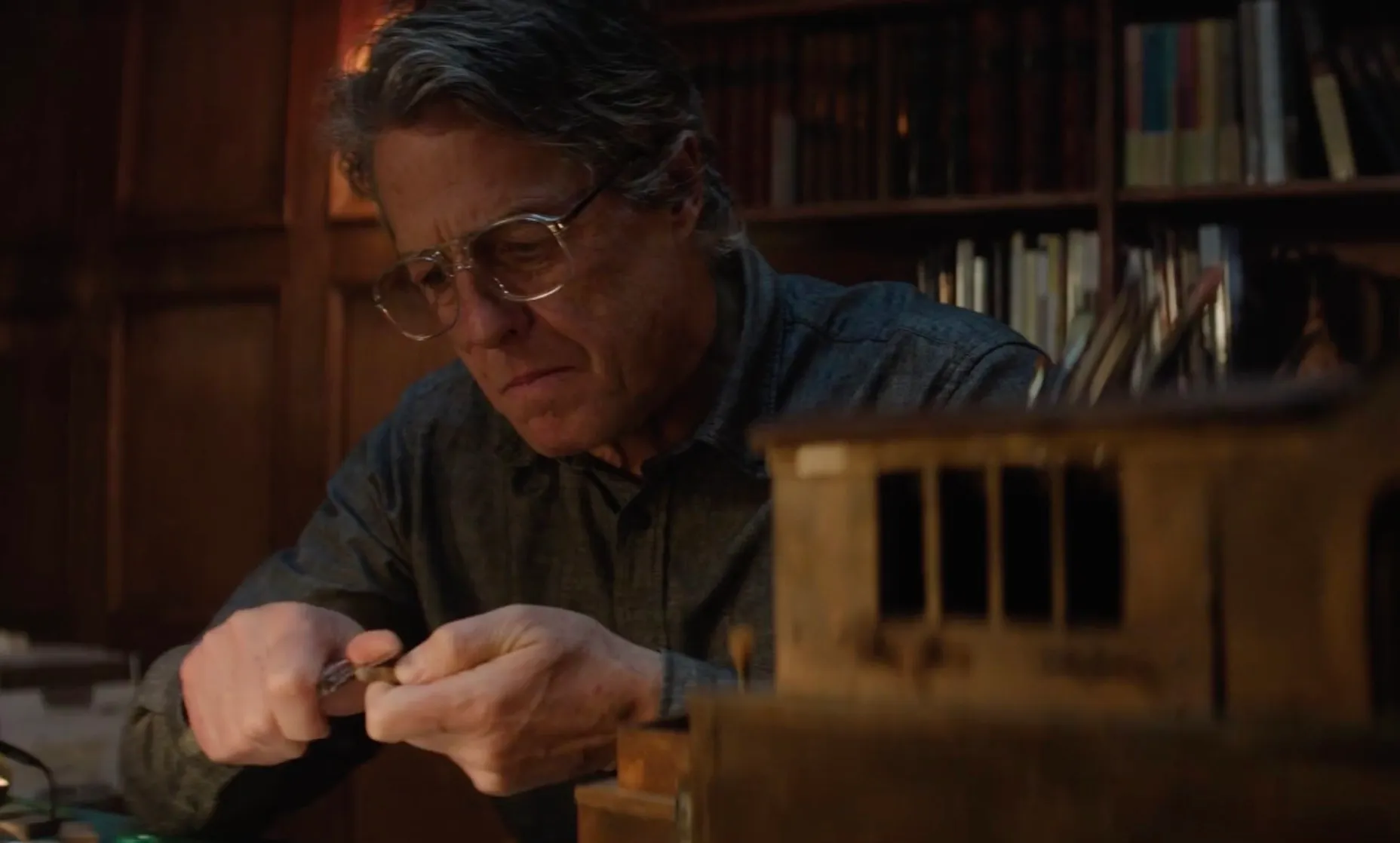Movie Reviews
Ballywalter review: Patrick Kielty is a revelation and Seána Kerslake exemplary in this moving drama

The story goes that when director Prasanna Puwanarajah offered Kielty the joint lead in this exquisite, economic drama, he thought it was a joke. The Co Down man had never acted in a film before. People knew him as a professional clown, a radio presenter, someone who, every now and then, makes a decent TV show. Why, thought Kielty, would they pick him to star in a moody, low-key indie about a couple of lost souls? Why not?
Filmed in between lockdowns, Ballywalter provided a much-needed boost for everyone involved. Kielty, a novice, brought his A-game – so, too, did his exemplary co-star Seána Kerslake.
Together they created something wonderful, something unique, something that deserves to find an audience. Nearly a million people tuned in to watch Kielty’s Late Late Show debut last week – will those same viewers show up in cinemas for Ballywalter? I hope so.
Patrick Kielty is unmissiable in ‘Ballywalter’. Photo: Helen Murray
Our story begins in a taxi. Eileen (Kerslake) is in a bit of a rut. The only thing she hates more than ferrying yappy strangers around Ballywalter is making lattes for ungrateful customers at the local coffee shop. These are decent jobs, but it isn’t how Eileen pictured her future.
A 20-something university dropout with a story to tell and zero interest in telling it, she was supposed to do something else, something bigger. She should be starting a new life for herself in London. Instead, she’s back in her hometown of Ballywalter, Co Down, where she drinks too much and is in debt to a rotten ex-boyfriend.
To make matters worse, she’s also trying to avoid a nasty delivery driver whose motorbike she ran over. Hard times, and the home situation (a deceased father, a pregnant sister and a worrisome mother) is getting harder.
An intervention is required. Enter Shane (Kielty), a middle-aged man on a mission. To Eileen, Shane is just another face, another fare. But Shane needs help. He, too, is back in Ballywalter after some time away. He has his reasons. For a start, Shane is recently separated from his wife.
To mend his broken heart, he enrols in a weekly stand-up comedy course. But there is a catch: the classes are 40 minutes away in Belfast, and Shane no longer drives, which means he needs someone to help him on his way. Eileen is that someone.
Seána Kerslake and Patrick Kielty in ‘Ballywalter’. Photo: Helen Murray
Their initial meeting is tense. Shane sits in the back with his headphones on; Eileen refuses to book his fares in advance. Eventually, these troubled, tortured souls share with one another the stories behind their sadness. Things get complicated.
With just 89 minutes on the clock, Ballywalter doesn’t mess about. These kinds of set-ups are tricky for everyone involved. The balance needs to be just right. Too much dialogue, and the film risks talking itself into a corner; too sentimental and you might alienate the viewer. It needs to be funny, not cheesy – sad, but never manipulative. Puwanarajah’s film hits the sweet spot.
Armed with a moving, meaningful screenplay by Stacey Gregg, Ballywalter speaks only when it needs to. It is, at its core, a refreshingly honest tale about depression, about what happens when the light begins to fade.
It’s about being stuck. Some of us know what that feels like, and Ballywalter applies delicacy and charm in all the right places. There are noisy, comical interludes (FYI, Shane is keen on dad jokes) and raw, emotional payoffs, but this tender, thoughtful drama works hard to earn them.
Tremendous performances help. Kerslake is every bit as good as you’d expect; Kielty is a revelation. One could argue that he is used to playing the part of a comic, but that’s not what Puwanarajah’s film asks of him. Instead, it asks him to portray a man who knows what he needs to do to fix his life, but can’t quite bring himself to do it.
It’s a remarkable turn – steady, natural, note-perfect. To these ears, there’s little wrong with Kerslake’s Northern accent, and the talented Dubliner delivers a controlled, charismatic turn as a young woman who’ll do anything to avoid the truth. Together, our star performers play a blinder. In a word? Unmissable.
Four stars

Movie Reviews
Film Review: Heretic – SLUG Magazine

Film
Heretic
Director: Scott Beck, Bryan Woods
Beck/Woods, Shiny Penny
In Theaters: 11.01
As a native Utahn who group up in the LDS Church, and a cinephile, I’ve often lamented the fact that while the church gets a certain amount of representation in film, we haven’t had anything close to a horror film since Trapped by The Mormons in 1922. It’s not like the genre doesn’t have plenty of potential. Family Home Evil and Baptism for The Walking Dead—these concepts practically write themselves. Count your blessings, brothers and sisters, because with the release of Heretic, the second coming of the genre is here at last.
The story takes place in a rural Colorado town, where a pair of missionaries, Sister Paxton (Chloe East, The Fabelmans) and Sister Barnes (Sophie Thatcher, The Book of Boba Fett) are having a discouraging day, having no luck making new contacts and even getting harassed by a group of teens who pull down Sister Paxton’s skirt to see if she is really wearing “magic underwear.” Despite a rainstorm, they decide to stop by the home of a potential golden contact, Mr. Reed (Hugh Grant, Four Weddings and a Funeral, Paddington 2), a charming man who has done his studying and expressed a great deal of interest in the church. While they are wary of entering his home without another woman—rules require them not to be alone with a man—Reed assures them that his wife is in the kitchen baking a blueberry pie. Once inside, the sisters relax as Mr. Reed starts discussing religion, pulling out a heavily notated copy of the Book of Mormon. Sister Paxton is quickly put at ease by his friendly demeanor, while Sister Barnes remains uneasy. As the conversation progresses, and Reed begins to pointedly question their beliefs, they realize that Reed hasn’t invited them to his house to convert him. Is he trying to convert them? Or does he have something even darker in mind? As he tricks them into going into the basement, he reveals two doors, one marked “belief” and one “disbelief,” and they must choose which will lead them to safety.
There’s already a rather vocal crowd labeling Heretic as an attack against the LDS faith, but while it raises many interesting questions about religion and touches briefly on church history, the film doesn’t push any one point of view, and it’s certainly not designed to malign the faith. , Writer-director team Scott Beck and Bryan Woods, who co-wrote A Quiet Place with John Krasinski, have created a horror film with a highly intriguing premise, and Mormonism is simply the religion that best fits it’s terrifying premise. The Sister missionaries are great characters who easily come across as young and naïve, yet they also show great moments of strength, drawing on their faith to bolster themselves. If you believe that any mention of the polygamy or the simple fact that Temple garments seem rather strange to most nonmembers, then yes, you will be every bit as offended as you want to be. If you can keep an open mind, you’re unlikely to find anything to be directly offended by here. The fact is that the Mormons are the protagonists, not the villains, and just as they did in a Quiet Place, Beck and Woods demonstrate that horror is at its scariest when it follows good people whom you can genuinely care about. That’s not to say that it’s a pro-Mormonism movie, either, it’s just a movie. The philosophical and theological deep dive that the clever script take wisely leaves the audience with plenty of room to get what they choose out of it. I even took my actively religious mission companion to the screening as my plus one, and we both thoroughly enjoyed the film.
Grant is a diabolically delicious and wonderfully complex villain, and it’s a performance and a character who deserves to join the ranks of Hannibal Lecter and Misery’s Annie Bates. It’s still Thatcher and East who drives the film,, and both are likable and engaging. The fact that Thatcher grew up LDS and her family is still active was undoubtedly an asset in capturing the culture and the details with such impressive accuracy. Topher Grace (That ‘70s Show) is effective as Elder Kennedy, a local stake or ward mission leader (it’s never quite specified) who goes searching for the Sisters when they don’t show up at the Church for an appointment, and he gets one the film’s best comic relief moments.
I’m not telling anyone that they have to see Heretic if they don’t want to, but I’d be ungrateful if I didn’t take this opportunity to bear my testimony that whatever your religious affiliation or lack thereof may be, this movie isn’t out to get you. It’s simply an extremely smart and atmospheric thriller that explores themes of the nature of belief and how it shapes our lives and our actions in a way that will give you a lot to talk about, and it’s one of the best suspense films I’ve seen in decades. I say these things in the name of Alfred Hitchcock. Amen. –Patrick Gibbs
Read more film reviews here:
Film Review: Here
Film Review: Utah Queer Film Festival 2024
Movie Reviews
Movie Review: Church and Politics mix and mingle among the “Godless”

“Godless” is a self-serious drama about the collision of politics and faith with a couple of decent moments and solid lead performances by Ana Ortiz and Harry Lennix going for it.
Working against it are a static staginess in the action — lots of talk and debate, little of it setting off any sparks — a truncated dramatic arc, messiness in the order of events as they’re presented (basically its a long flashback) with an abrupt “atonement” and reconciliation attempt for its finale.
But again, there’s serious subject matter to wrestle with.
Writer (“The Brooklyn Banker”) turned first-time writer-director Michael Ricigliano drops into a world of heavy-handed Catholic politicking as an upstart bishop (Lennix, a big and small screen veteran and regular on “The Black List”) excommunicating a gay marriage-endorsing, abortion-protecting New York governor (Ortiz, of TV’s “Ugly Betty” and “Love, Victor”).
The bishop is new to Brooklyn, and while he sent a letter “warning” to the governor, his Latin, sealed-in-wax edict can’t be read by any non-Catholic living in America in 2024 as anything but religious minority election interference.
Thus our first impression of Bishop Rolland, clumsily avoiding press questions about if “the Vatican is on board with this” as he condemns a Latina Catholic governor who “ceased to live as a Catholic” when she signed off on legislation, is that he’s a fanatic somewhat out of his depth as a political showboater.
Then we get a load of the turmoil in the archioceses, with a bishop (Thomas G. Waites) and archbishop (Dan Grimaldi) weighing whether they have the leverage to make this pay off.
Because popular Gov. Porra seems destined for the White House. And they simple can’t have a pro choice Catholic living on Washington’s Pennsylvania Ave.
Gov. Porra is facing a primary challenge, with her top aide (Patrick Breen) all-in on her drawing a broad coalition and doing “the right thing.” He’s gay, and bringing him along for “negotiations” with the unelected church power elite gives him the film’s only funny line.
“I’m Jewish!”
“So was Jesus,” the governor notes.
“Look what happened to him.”
There’s a squishiness to the point of view Ricigliano tries to impart here, a governor who says “I will not legislate my beliefs,” who says “contritition” is “not an option,” but who is conflicted about a bill the screenplay repeatedly refers to using right wing labeling — “late term abortion.”
The denial of Holy Communion to the governor by her parish priest is the jolt such political stunts are meant to deliver.
But a lot of counter-strategies are suggested by both sides, meeting in private, which are merely mentioned and not followed up on. An awful lot of the talk and scene-changing here seems pointless.
And then we get to the long third act meeting of reconciliation between the two, years later, introducing their “real” beliefs and guilty reasoning.
The leads in “Godless” dig into the “idea” for an interesting film. But this feels like the compromised, lost-its-nerve and too-short-to-score-points version.
Rating: R, profanity
Cast: Ana Ortiz, Harry Lennix, with Patrick Breen, Sarah Wharton, Dan Grimaldi and Thomas G. Waites.
Credits: Scripted and directed by Michael Ricigliano. A Without a Net release.
Running time: 1:26
Movie Reviews
The Substance movie review: Demi Moore shines in audacious body horror on ageing

The Substance movie review: Coraline Fargeat’s French film The Substance, perhaps the most brutal film of the year- goes to bitter, agonizing extremes. It has a fury and rage that feels utterly distinct in its own genre of body horror. The body here is that of an ageing woman named Elisabeth Sparkle, who is striving hard to reconcile with the fact that she might just be forgotten in the crowd of younger and more attractive women. As Demi Moore plays her, the body hides an insecurity so deep and relentless that it cuts through the screen. (Also read: Demi Moore filmed 45 ‘very difficult’ takes of ‘heart-wrenching’ scene in The Substance: ‘Got to a point where I…’)
The fountain of youth turns red
Elisabeth is a former star, who is now happy doing her exercise show, but soon enough, she hears that her chauvinist boss (played by Dennis Quaid) is looking for a younger replacement. She escapes a near-fatal accident and, in the process, chances upon an ad for something called The Substance. It can create a younger version of herself by injecting the activator. Every seven days, the original must swap roles with the doppelgänger. Is it safe? What are the consequences?
Elisabeth does not have much time to mull over these questions. Desperate, she quietly returns to her huge Los Angeles apartment (excellently designed by Stanislas Reydellet), which boasts huge glass walls that provide a bird’ s-eye view of the city. The space distinguishes her loneliness as tragically immense and unforgiving. She decides to take the substance, and then it emerges, tearing her backbone apart: her replacement is a much younger woman played by a pitch-perfect Margaret Qualley. She is Sue.
Demi Moore gives career-best performance
Sue swaps her role as the new face doing those same exercise routines, and her instant rise to stardom means she needs more time and more days. This also means working a little around the rules of using The Substance. Elisabeth begins to resent Sue midway, which forms some of the most hard-hitting scenes in The Substance- away from its all-out bloodied unsubtlety towards the second half. Moore, in her finest hour on screen, is devastating to watch as her self-worth fades away gradually, distilled in this particular scene where she gets ready to meet the one person who has been kind to her for a change. Elisabeth’s own insecurity is the real horror, as she proceeds to smudge it all off with her bare, harsh hands.
Final thoughts
The Substance loses some of that restraint and reflectiveness during the last hour, when Fargeat seems to take the body horror to such an extreme that it glosses over its own critique of ageing and the sexist male gaze. However, it is still relentlessly violent, gruesome, and sickly funny to experience the havoc that happens, thanks to the instantly memorable work of prosthetics and makeup effects designer Pierre-Olivier Persin.
Ultimately, I was left troubled with the body politics of The Substance, a film that only wants to critique what it means to age and unlove oneself. Fargeat’s vision is laced with a riotous fury and audaciousness that gives it back to the establishment that sets these absurd beauty standards. But does it do better in deconstructing this very idea of what ageing looks like in a vastly judgmental world? The dizzying, off-the-rails ending is a problem here because it places the consequences firmly on the feet of the woman herself. She has nowhere to hide, nowhere to go. It is her biggest nightmare come true- facing the world with a frightening version of herself.
Behind the severe shock value, The Substance does little to amplify Elisabeth’s desperation and agony. Who is Elisabeth when she is not defined by the disillusionment brought in by her ageing? Elisabeth exists in this one myopic fulcrum of judgment. So she punishes herself more and more as the film progresses. Suffering and slowly driven to madness. The Substance might as well be treated like a blood-soaked question mark on the unrealistic beauty standards that continue to plague the showbiz.
The Substance is streaming on Mubi.
-

 Movie Reviews1 week ago
Movie Reviews1 week agoAlien Country (2024) – Movie Review
-
/cdn.vox-cdn.com/uploads/chorus_asset/file/25431700/STK201_SAM_ALTMAN_CVIRGINIA_A.jpg)
/cdn.vox-cdn.com/uploads/chorus_asset/file/25431700/STK201_SAM_ALTMAN_CVIRGINIA_A.jpg) Technology7 days ago
Technology7 days agoOpenAI plans to release its next big AI model by December
-

 Health6 days ago
Health6 days agoNew cervical cancer treatment approach could reduce risk of death by 40%, trial results show
-

 Culture7 days ago
Culture7 days agoTop 45 MLB free agents for 2024-25 with contract predictions, team fits: Will Soto get $600M+?
-

 Sports5 days ago
Sports5 days agoFreddie Freeman's walk-off grand slam gives Dodgers Game 1 World Series win vs. Yankees
-
News5 days ago
Sikh separatist, targeted once for assassination, says India still trying to kill him
-

 Culture5 days ago
Culture5 days agoFreddie Freeman wallops his way into World Series history with walk-off slam that’ll float forever
-

 Technology4 days ago
Technology4 days agoWhen a Facebook friend request turns into a hacker’s trap




















